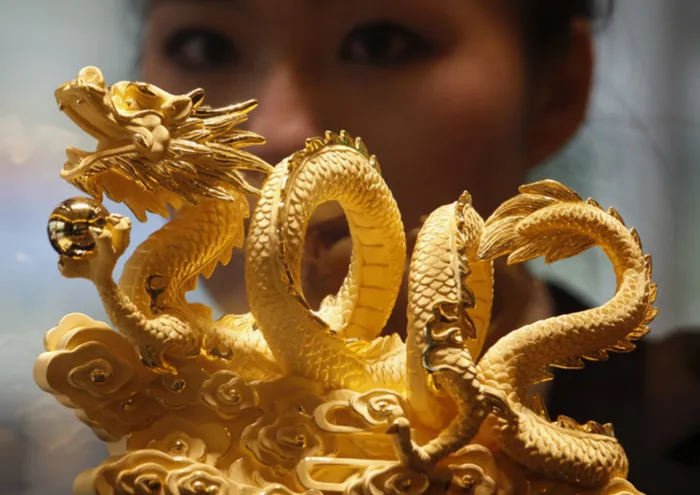Gold slips

A sales representative poses behind a nine-tael 24K gold in the shape of a dragon forming the numerals "2012", symbolising the upcoming Year of the Dragon, at a Chow Tai Fook Jewellery store in Hong Kong December 6, 2011. A sales representative poses behind a nine-tael 24K gold in the shape of a dragon forming the numerals "2012", symbolising the upcoming Year of the Dragon, at a Chow Tai Fook Jewellery store in Hong Kong December 6, 2011.
Gold prices slipped in Europe on Friday as the euro eased from a two-month high, coming under pressure as the optimism sparked by Greece's agreement of the austerity measures it needs in order to receive a second rescue package dissipated.
Euro zone finance ministers are seeking further measures from Greece before signing off on a second bailout, keeping the threat of a chaotic default alive and pressuring risk appetite.
Spot gold was down 0.8 percent at $1,716.49 an ounce at 12:25 SA time, while US gold futures for February delivery were down $21.30 an ounce at $1,719.90.
“Gains in the US dollar and consistent disappointment from the European Union regarding the Greece debt deal are curbing any gains in gold,” said Pradeep Unni, senior analyst at Richcomm Global Services.
“Even if a debt deal does come out, the complications are far from over. With an over 26 percent unemployment rate in Greece, austerity means further job cuts, and tax increases,” he added. “The key point on pensions are still to be finalised.”
Gold is still up 10 percent this year as traders bet US monetary policy will remain accommodative this year. It rose above $1,750 an ounce on Thursday after Greek leaders agreed to a deal on reforms needed to avoid a default, lifting the euro.
But the single currency eased back 0.2 percent against the dollar on Friday. Eurogroup chairman Jean-Claude Juncker said a further 325 million euros of spending cuts needed to be found by Greece and, with Greek elections looming, political assurances were needed that the plan would be implemented.
European shares fell, dragged lower by banks on concerns about the outcome of the euro zone debt crisis, while safe-haven German government bonds rose.
Oil prices also slipped on Friday in line with other markets, though they are expected to remain firmly underpinned by ongoing tensions with Iran, the world's fourth-largest crude oil producer.
INDIAN DEMAND FIRMS
Physical gold demand from the world's biggest bullion consumer, India, improved on Friday as prices eased back from two-month highs. “Demand is better than the last two days as prices have cooled off a bit,” said one bullion dealer in Mumbai.
Also positive for prices, the biggest operator of US futures exchanges, the CME Group, on Thursday lowered trading margins for a range of commodities contracts, including gold, silver and platinum.
“In August and September of last year, CME almost doubled the margin within just a few weeks, thereby contributing to the sharp fall in the price of gold,” Commerzbank said in a note.
Indonesia is to ban exports of some raw materials, including gold and silver as well as base metals like copper and tin, from 2014, the Mineral Resources Ministry said on its website.
Indonesia was the world's seventh-largest gold producer last year with output of 115 tonnes, according to metals consultancy GFMS, and produced 6.9 million ounces of silver in 2010, making it Asia's fourth-largest miner of the metal.
Silver was down 0.8 percent at $33.60 an ounce. Spot platinum was down 0.6 percent at $1,642.49 an ounce, while spot palladium was down 1.3 percent at $697.30.
President Jacob Zuma squashed more than two years of talk on Friday about the nationalisation of South Africa's massive mining sector, saying state control or ownership of the mines in the world's biggest platinum producer could not work.
However, South Africa's mining sector - the fifth-biggest in the world by value - faces the prospect of higher taxes and royalties as the government tries to squeeze out better returns for the country's 50 million people.
“Had the ANC promoted a pro-nationalization agenda we believe the impact on PGM prices would have been very bullish as foreign investment and quite possibly professional expertise would have deserted the country, with a commensurate negative impact on production,” said HSBC in a note.
“As it stands we believe the report is still modestly bullish. Higher taxes on producers are bound to curb investment and production to some degree, all other factors being equal.” - Reuters